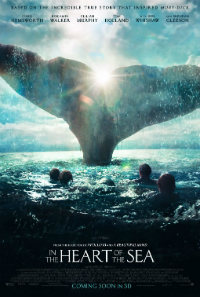Two if by Sea: Howard’s Whaling Expedition Sinks to the Fathoms
 Herman Melville’s 1851 novel Moby-Dick is one of the seminal epics of American literature, adapted several times for film and television over the decades, though John Huston’s 1956 film version still stands as the most accomplished cinematic rendering. Director Ron Howard adapts Nathaniel Philbrick’s 2000 novel In the Heart of the Sea: The Tragedy of the Whaleship Essex, a retelling of the aquatic ordeal upon which Melville based his famous text. Suffering from some obnoxious moments of stilted bids at heroic nobility from its central characters and weighted down with considerable cliché, the screenplay, adapted by Charles Leavitt, Rick Jaffa, and Amanda Silver, is a framed narrative that doesn’t seem to have sparked the passion of its adapters. Saddled with a PG-13 rating, which hampers the narrative’s more sensational elements, (such as the depiction of cannibalism), not to mention the absence of the usual human bodily functions of swarthy men stranded at sea, Howard’s seafaring epic may have a majestic scope but he’s been corralled with the type of restraints we’re accustomed to seeing in made-for-television items.
Herman Melville’s 1851 novel Moby-Dick is one of the seminal epics of American literature, adapted several times for film and television over the decades, though John Huston’s 1956 film version still stands as the most accomplished cinematic rendering. Director Ron Howard adapts Nathaniel Philbrick’s 2000 novel In the Heart of the Sea: The Tragedy of the Whaleship Essex, a retelling of the aquatic ordeal upon which Melville based his famous text. Suffering from some obnoxious moments of stilted bids at heroic nobility from its central characters and weighted down with considerable cliché, the screenplay, adapted by Charles Leavitt, Rick Jaffa, and Amanda Silver, is a framed narrative that doesn’t seem to have sparked the passion of its adapters. Saddled with a PG-13 rating, which hampers the narrative’s more sensational elements, (such as the depiction of cannibalism), not to mention the absence of the usual human bodily functions of swarthy men stranded at sea, Howard’s seafaring epic may have a majestic scope but he’s been corralled with the type of restraints we’re accustomed to seeing in made-for-television items.
In 1820 Nantucket, Owen Chase (Chris Hemsworth) struggles to rise in the maritime ranks to the position of Captain. However, since he comes from a family of farmers, his ascension is difficult in an industry dependent on nepotism. But since whale oil keeps lights burning in the US, business is booming during the period and Chase builds himself a solid reputation for providing solid returns on the precious substance. Thinking he would next be promised to helm his own boat, he’s dismayed to be offered the position of first mate on the Essex, his position held for the inexperienced Captain George Pollard (Benjamin Walker). Agreeing to the sleight and taking a written promise to be promoted to captain on his next ship, the Essex sets off for whale oil. Unpleasant posturing from Pollard creates a toxic atmosphere on the ship, until their mission comes to a screeching halt when they encounter an angry Sperm whale intent on sinking them. The massive creature succeeds in ruining the vessel and leaving the men stranded at sea for ninety days. Thirty years later, author Herman Melville (Ben Whishaw) seeks out the last surviving member of the mission, Thomas Nickers (Brendan Gleeson) so he can get first hand details for his new novel.
At the heart of Howard’s lethargic epic is a distracting Chris Hemsworth, the Australian matinee idol struggling to maintain the Eastern New England accent demanded of his character. The publicized dietary restrictions of the principal cast members for the grueling duration of the film’s second portion hardly seems necessary when their slender frames are enhanced by considerable make-up effects, leaving poor Cillian Murphy with little do beyond providing the film’s only potentially emotional sequence. But since he’s never developed as more than a mere peripheral sidekick to Hemsworth’s Chase, it’s only one more emotionally vacuous exchange.
DoP Anthony Dod Mantle, who won an Oscar for Slumdog Millionaire, gets all wrapped up in the staunchly oppressive sea-faring special effects, which somehow look resoundingly cheap despite the film’s studio budget. Dialogue is also stupendously mawkish, particularly in sequences shared by a resolutely solemn Gleeson and the inventively cast Whishaw as Melville. Speculation on Melville’s sexuality (his first novel Billy Budd is considered one of the first queer texts) along with homosexual themes and sexual imagery throughout his novel Moby-Dick aren’t touched upon here, though pointed reference to Melville’s wife and forthcoming child is included. But one would hardly expect the likes of Ron Howard, the director who completely sanitized the sexuality of John Nash in his famed 2001 film A Beautiful Mind, to delve into such complexity.
To describe In the Heart of the Sea as routine would be entirely too kind since it’s a film failing on every conceivable level of artistry. Neither displaying the eternal conflicts which inspired Melville in the first place nor conveying even obvious suitability as a survival of mankind against nature’s odds, this is achingly dull filmmaking of the sort we’d expect to see from mindless hired hands from the golden era of the Hollywood studios.
★/☆☆☆☆☆


